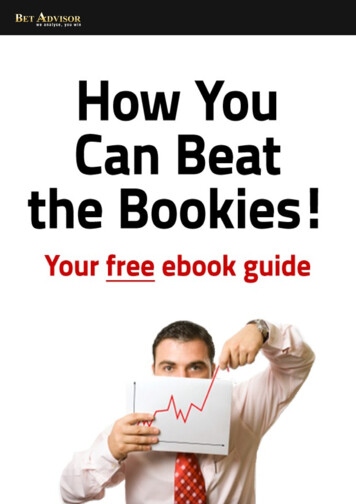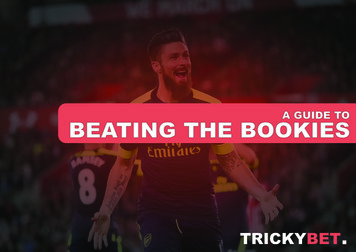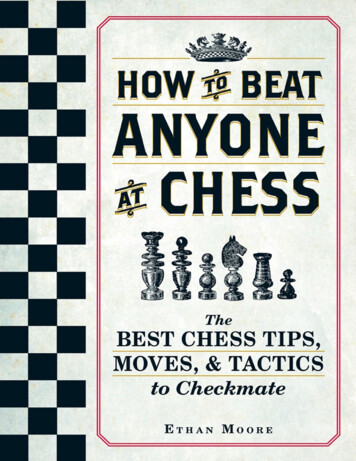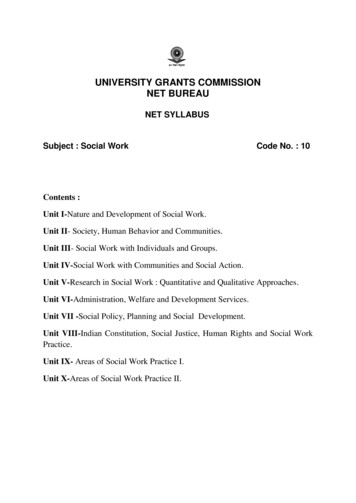
Transcription
Beat The Bookies With The Pro TipstersTable of ContentsHow YOU CAN Make Money Betting on Sports.3Introduction.3What are professional sports betting tipsters?.3How professional tipsters can beat the bookmakers.4Surely bookmakers don’t make mistakes!.41. Going against the crowd.42. Early information.43. Niche markets & expertise.4Tipsters’ pricing models (how they find value).5HOW MUCH CAN YOU MAKE FROM SPORTS BETTING?.6Returns per tipster.6Betting bank growth: compounding your bets.6THE ADVANTAGES OF SPORTS TIPSTERS.9Proofed results.9Certified most trustworthy service!.9Diversified profits.9How it works.9Proven sustainable profits .10How You Can Start Making Money Today.11Step 1 – Set up your betting bank.11Step 2 – Your first subscription.11Step 3 – Build your portfolio.11WHY BETADVISOR IS THE #1 TIPSTERS PLATFORM.12Get your picks in real time .12Great customer service.12Pause your subscription.12Switch tipsters.12Track your stats.12
How YOU CAN Make Money Betting on SportsIntroductionNot everyone makes money from gambling, let’s face it. In fact, 98% of people whobet on sports lose money in the long run.It has to be that way, otherwise bookmakers 1 would go out of business!However, a small number of smart punters 2 do turn over a profit year in and year out,betting on the same sports events as everyone else.The curious thing is that many of these people don’t specialise in the sports they arebetting on. They simply check their emails or SMS alerts then place their bets online.So what are these people doing?The answer is simple. They are getting their tips from professional sports bettingtipsters3.What are professional sports betting tipsters?What makes a professional sports tipster different is that, instead of focusing onwinners, they focus on price.The difference between the average punter and a professional is that theprofessional knows what the price (the odds 4) should be on an event and only betwhen those odds are weighted in their favour. By contrast, the average punter willlook for winners regardless of the odds offered.While the professional might lose money in the short term, in the long run they tendto be consistently in profit. Here’s how.How professional tipsters can beat the bookmakersIn order to spot value, the professional tipster is looking for when a bookmaker hasmade a mistake with the odds they are offering. (For example, this might be puttingup Chelsea to win away at odds of 1.80, when they really should be 1.50.)Spotting an error like that doesn’t mean you are more likely to win, but it does ensurethat if you do win, you’ll win more money than you should have.This is the all-important area where the pro tipsters make their long-termprofits.1Bookmaker: A company whose business is to offer betting opportunities, mainly on sporting events.Punter: a gambler betting on horse racing3Tipster or Handicapper: A person who gives or sells his estimate of the likely winners of a race, game orevent.4Odds: In gambling, the odds are the amounts that the bookmaker will pay out on winning bets2
Surely bookmakers don’t make mistakes!Let’s be clear, the bookmakers get their prices right most of the time, but there areplenty of opportunities to spot where they have taken their eye off the ball. Here arejust three reasons why 1. Going against the crowdIf a big weight of money comes in on a player, team or horse, the bookmaker isobliged to shorten the odds and control their liabilities 5. In order to balance theirbooks and maintain interest in the event, the bookies might then push up the oddson the opposing player or team.The skill involved is knowing when the crowd is wrong and when to go against theflow to snap up the juicy value6 on offer.2. Early informationBookmakers aren’t always as quick as they should be. Often they can be slow toreact to injury news, giving a professional tipster the opportunity to respond first.For example, a pro tipster might get an early paddock report from a certain trainerand re-calculate their prediction before the bookies catch wind of a horse’s realpotential.3. Niche markets & expertiseIn their quest to take more money and increase their betting turnover, bookmakershave expanded into sports and leagues that they cannot hope to cover fully. Everyday there are often over 100 horses racing in the UK and thousands of matchestaking place across Europe.Overworked and underpaid odds compilers 7 are not always going to be able to priceeverything with 100% effectiveness. It seems to us that bookmakers’ odds compilersmay be required to select the odds on football leagues that they are somewhatunfamiliar with.If you use a sports betting tipster who specialises in those leagues, they may be ableto price up games better than the bookmaker.Tipsters’ pricing models (how they find value)Bookmakers mostly use mathematical models to price their odds, which are tweakedas team news or jockey changes are announced. Some tipsters have developedways to price up an event with greater accuracy by approaching opportunities from adifferent angle.A professional soccer tipster might first use his mathematical model to assess howlikely each outcome is in a football match and bet only when the bookie’s odds are intheir favour.‘Implied probability’ is what the available odds are telling you about the likelihood of ateam winning or losing in a football match. To work this out, you take 1 and divide itby the decimal odds with the answer then converted to percentage.5Liability: the liability represents the amount of money you have engaged on a specific bet and you might loseif you lose your bet.6Juicy value: Amount of the commission kept by the house (the bookmaker)7An odds compiler (or trader) is a person employed by a bookmaker or betting exchange who sets the odds forevents (such as sporting outcomes) for customers to place bets on.
The classic example is odds of 2.0 (evens money): 1 divided by 2.0 is 50%, whichmeans that the bookies implied probability of that event winning is 50%. If you thinkthe outcome is more likely than this then you’ve got a value bet.The table below shows how a professional football tipster might use a system he hascreated for pricing football matches.“Your Estimate” is the tipster’s estimated probability of that selection winning.“Bookies Implied Probability” is implied chance of success of that selection going bythe bookie’s odds.For example, with the Everton vs Sunderland game, the tipster’s modelmight have said Everton were 66.7% likely to beat Sunderland, while thebookmaker’s odds implied they only had a 57.14% chance. Thisrepresents a 14.33% edge on backing Everton. The odds are relativelyshort at 1.75, but the tipster’s model seems to be saying they should beeven shorter than this.Backing all the selections in the example above would have given you a profit.
HOW MUCH CAN YOU MAKE FROM SPORTSBETTING?Returns per tipsterThe amount of profit generated depends on several factors. In the table below wehave listed several examples of profit generated by some of our current tipsters atBetAdvisor. The higher the stake8 you put on each bet, the more profit you wouldgenerate.Here are some results compiled for the the year 2010:Horse racingFormbetSignatureMicky BiggsBlue Sky ld16,8%22,0%22,9%39,96% 1009454529270806133Profit by Stakes 50047268264623540230666 100094536529247080461332 1002518422735432604Profit by Stakes 50012588211371771513022 100025175422753543026043Other sportsGeert Van ElsenLaurent MartyJurgen MeyerGreen Sports 5310255184Yield18,7%31,3%13,9%14,2%It is your total profits divided by your betting turnover used tomake those profits. The Profit column shows your return in‘points’.You can see that substantial (and reliable) returns can be made by following thepicks advised by professional sports betting tipsters like these. Compare thesereturns to interest rates offered by any bank.Now let’s look at some strategies for multiplying your likely profits still further.Betting bank growth: compounding your betsFlat staking is relatively simple; you follow a tipster using the same amount per betand you don’t change it - even if your betting bank doubles in size.8Stake : The amount of money wagered
For example you might start following a football tipster with 100 Euros perpoint and still follow him at 100 Euros per point 3 seasons later, even if yourbank has doubled.Compounding describes techniques for varying your stakes over time. There aremany different ways of compounding.The simplest method is simply to continually re-invest your profits back into youroriginal bank. Thus, your average stake size will increase as your bank increases(that’s the theory anyway). Effectively the more you make, the greater your stakesand thus the greater your profit.For example, let’s say I start with a 1000 betting bank. I then decide to risk no more5% of this amount per bet. At the end of each day, I recalculate my total bank,including the profit or loss from that day, and get a new 5% stake figure for the nextbetting day.Day 1 1000 starter bank.5% stake (1000*5%) 50I risk 50 per point on each bet on Day 1 and win 100 profit.Day 2Bank is now 1100 ( 1000 original bank 100 profit)5% stake (1100*5%) 55I risk 55 per pt on each bet on Day 2This then continues each day, where I recalculate my bank andadjust my stakes accordingly.When it works it is fantastic, but it can be a high risk strategy, which when appliedwrongly can cause all kinds of difficulties.The example below demonstrates the pros and cons of various compoundingmethods.
Let’s take one successful tipster on BetAdvisor who has returned a sustained longterm profit. Each method starts with a 2,500 betting account and 100 per pointinitially which is 1/25th (4%) of your available betting bank per point. The data showsthe monthly returns.Here are a few options for increasing stakes as profits increase:Flat stakes – Keep betting at 100 each month, never increase.Compound monthly – Start at 100 per point, but increase stakes everymonth at 1/25th (4%) of your betting bank.As you can see the more aggressive method (compound monthly) produces thebiggest profits, but it is also the most volatile. It works incredibly well when the tipsteris on a good run, but can work against you on a bad run.Here we can see that the monthly compound method was going great guns, bringingthe bank into over 23,000, but one negative month saw this shrink to around 13,000, a near 10,000 swing.Our advice is to be totally honest with yourself and don’t allow any headline profitfigures to sway your judgement. Very often the best approach is to simply follow aservice with simple level stakes and apply incremental increases at pre-set intervals.
THE ADVANTAGES OF SPORTS TIPSTERSProofed resultsFrankly, the betting world has more than its fair share of rogue tipsters who aim todeceive by skewing their results. The most common trick is to advertise only their bigwins, and not mention the thousands of losing bets they have also racked up.The good news is that there are a substantial number of honest and reliable bettingprofessionals out there. The key is knowing how and where to find t
books and maintain interest in the event, the bookies might then push up the odds on the opposing player or team. The skill involved is knowing when the crowd is wrong and when to go against the flow to snap up the juicy value6 on offer. 2. Early information Bookmakers aren’t always as quick as they should be. Often they can be slow to











